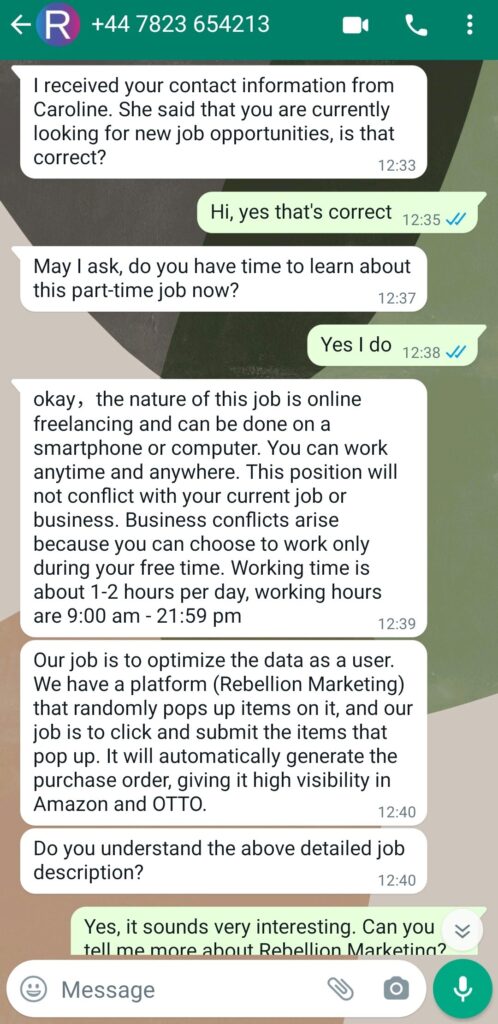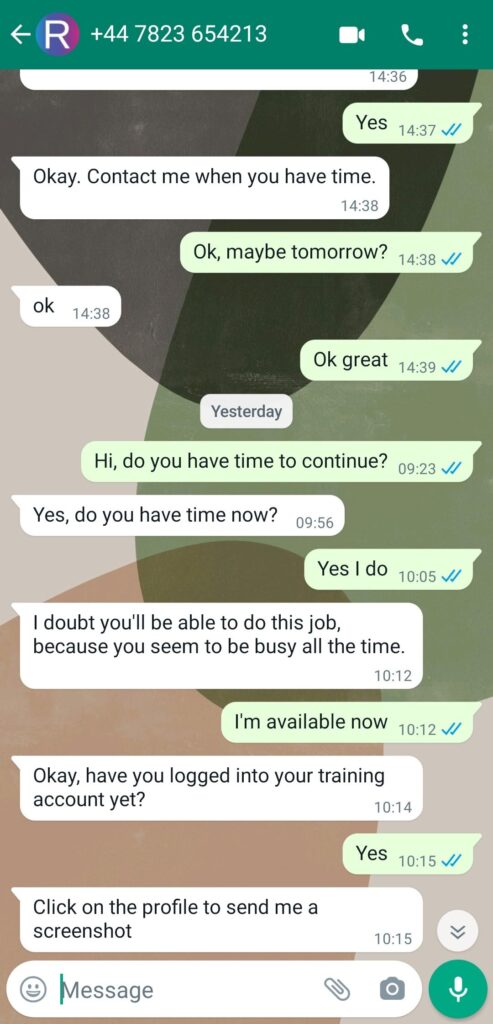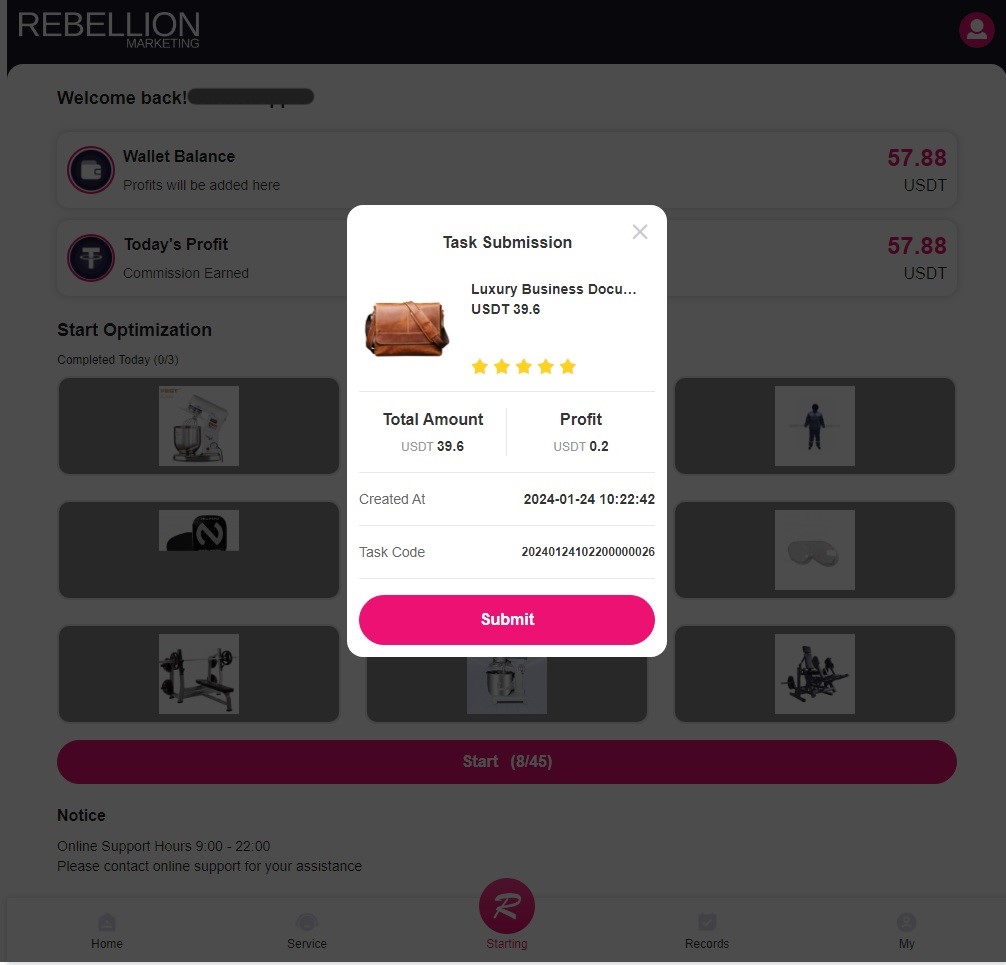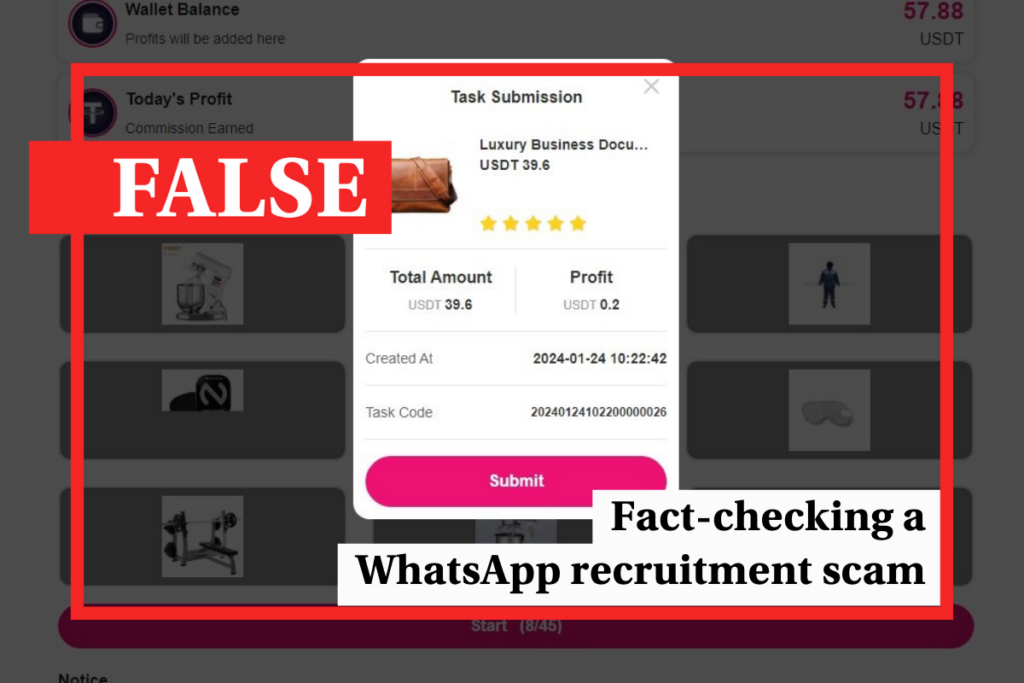“Hello, my name is Caroline and I am a recruitment agent from Archer IT Recruitment Malta. We are looking for a variety of part-time/full-time positions as these are online remote jobs”.
The WhatsApp message landed out of the blue on Monday afternoon, sent from what I later discovered to be an Indonesian telephone number.
Caroline was promising me the opportunity to earn thousands for as little as an hour’s work each day. All I needed was a computer and a “bankcard for salary payments”.
I immediately clocked that it was a scam but decided to play along.

Caroline told me that her “line manager” would be contacting me with more information about the job. I promptly received identical messages from two different British phone numbers saying that Caroline had told them that I was looking for a job. I replied to both.
One of the lines went silent but the other proceeded to describe the job as “online freelancing” that would allow me to work “anywhere and anytime” without impacting my current job.
Over €5,000 a month for an hour’s work each day
My role, I was told, would be to “optimize the data as a user”, a gibberish description that was never really clarified despite my asking about it several times throughout our conversation.
I was told I would need to log on to a platform that “randomly pops up items on it, and our job is to click and submit items that pop up”, leading to “high visibility” in Amazon and German retail giants OTTO.

This turned out to mean that I’d be submitted an endless stream of five-star reviews for random products on these websites, from shoes to screwdrivers, handbags to hairdryers.
I would be working for a company called Rebellion Marketing, they said. A quick Google search revealed that this is the name of a reputable marketing company based in Portsmouth, UK.
I asked for more information about Rebellion Marketing, hoping to learn more about my future employers.
Minutes later, I was sent the company’s legal registration documents, presumably to persuade me that I was joining a legitimate business. In reality, these documents are freely accessible to anyone through the UK’s business registry.
Eventually, my interlocutor revealed that her name was Helen and that she had been assigned to be my trainer and to ease me into the job.
Helen told me that I’d be paid in USDT, a cryptocurrency stablecoin that is pegged to the US Dollar. “It’s as safe as your bank account”, she said, reassuringly.
She launched into a confusing description of what I’d earn, with a seemingly stable salary topped up with various bonuses depending on how many tasks I completed. In brief, I could earn 5,500 USDT (a little over €5,000) in a month, together with additional “daily commission”, I was told.
“Will I have a contract?”, I asked timidly. It would automatically be signed when I opened my account, Helen said, no need for these petty worries.
What about tax? Would I be taxed in Malta or in the UK?
“No, please don’t worry because the company has already done it for you!” Helen exclaimed.
Signing up for training
With my lucrative tax-free job lined up, I was finally ready for my induction.
Helen directed me towards the platform, at a website called rebellionwork.com, asking me to register an account. I duly obliged.
It quickly transpired that the scammers didn’t just borrow Rebellion Marketing’s, they also stole the company’s photos, videos and logos to make their operation appear genuine.

What followed was a convoluted verification process with a back-and-forth of access codes and screenshots involving an AI-driven “customer service” bot.
My account was finally set up but, by this time, over two hours had elapsed and my real-life job was calling.
“I’m afraid I have to go soon”, I said. Could we continue the training tomorrow? Helen begrudgingly agreed.
I soon found out that Helen wasn’t pleased with the delay.
“I doubt you’ll be able to do this job, because you seem to be busy all the time”, she snapped the following morning.
“I have time now”, I pleaded, fearing that I was about to be fired from a job I had yet to start. Helen relented.

I was guided back to the platform to start my training through Helen’s terse instructions, punctured by the occasional overly-excited claim about how I could earn (“My account was upgraded to VIP2, and because I deposited 1000USDT the platform rewarded me with 60USDT!”).
My training involved submitting 45 “optimisations” (or online reviews) and heading back to the AI customer care chatbot to verify a series of fake transactions.

Friends, not colleagues
I thought I’d spice up this tedious task with some small talk. “If we’re going to work together I’d like to get to know you a little more”, I told Helen.
A long pause followed.
“I’m in England. I run my own little coffee shop”, Helen eventually replied. “If you ever come to London, I’ll buy you a coffee”.
“I think I make very good coffee” she added with a hint of pride.
It turns out that I am, in fact, planning a trip to London. Where could I find her once I’m there?
“I live near Buckingham Palace in London”.

After we established that her coffee shop had never been visited by members of the royal family (“I’m just a regular guy”, Helen said, rather confusingly), we decided that it was time to get back to business.
I had finished my tasks, now it was time to cash in.
Want to cash in your earnings? Just pay here.
Helen told me that I needed to open a crypto exchange account, suggesting either Binance or Bybit as good options.
While I proceeded to open my account, Helen told me more about how I’d be paid. I’d need to complete two tasks (or two sets of “optimisations”) each day for five consecutive days to receive my rewards and I would be able to withdraw my earnings as soon as I’m done.
Once my crypto account was set up, Helen began sending step-by-step instructions, eventually leading me to the exchange’s deposit page and telling me to click on the deposit button to submit the funds I needed to access my earnings.
I hesitated. “Why am I depositing money?”, I asked.
This is to “ensure that the data is optimised for truthfulness”, came the baffling reply.
But I wasn’t to worry, “the funds are returned to our account when we complete a task”, Helen said, “I promise you on my life”.
It’s here that our communication went cold. Helen, presumably frustrated at having come so far, grew tired of my hesitation. My supposed earnings would have to remain unclaimed, my possible career as a data optimiser cut short.
Over 1,000 fake job offers a day in the UK
Data optimisation scams are believed to be among the largest growing types of fraud, first emerging in late 2022 but coming to the fore in the Spring of last year, with one Euronews report estimating that over 1,000 people in the UK now receive these scam job offers each day.
These scams often lure victims into believing that they are on to a good thing by allowing them to withdraw small amounts of their earnings before demanding they pay ever-larger amounts to access their funds.
Having invested so much time and money into the process, victims often relent, hoping that they will recover their losses with one more payment.
This, of course, never happens, and victims are unlikely to ever see their money again.
Archer IT Recruitment and Rebellion Marketing distance themselves from the scam
Both companies named in this particular scam confirmed that they have nothing to do with the scam when contacted by Times of Malta.
Paris Michailos, Archer IT Recruitment general manager, said that they first became aware of the scam at the beginning of the week, when a client contacted them to ask whether the WhatsApp message they had received was genuine.
“We promptly informed our candidates through our official website, cautioning them about the situation, and simultaneously reported the incident to local authorities.”
The company “would never initiate contact with our candidates or clients through WhatsApp for job offers”, he added.
Rebellion Marketing director Jade Arnell, on the other hand, had no idea that her company’s name and image was being used fraudulently.
“I’m so shocked that this is going on”, Arnell told Times of Malta. “We have reported the incident to the police and will be working with action fraud to hopefully take down the scammers”.
In a video posted to her Facebook page later in the day, Arnell said that they had since been contacted by “several people” who were scammed out of “significant sums of money”.
Despite this, Arnell was informed by Action Fraud UK, the UK’s reporting centre for fraud and cybercrime, that while this is a case of identity theft, it is not classified as a “police recorded crime” and that they would be taking no further action unless somebody who has lost money through the scheme comes forward.





